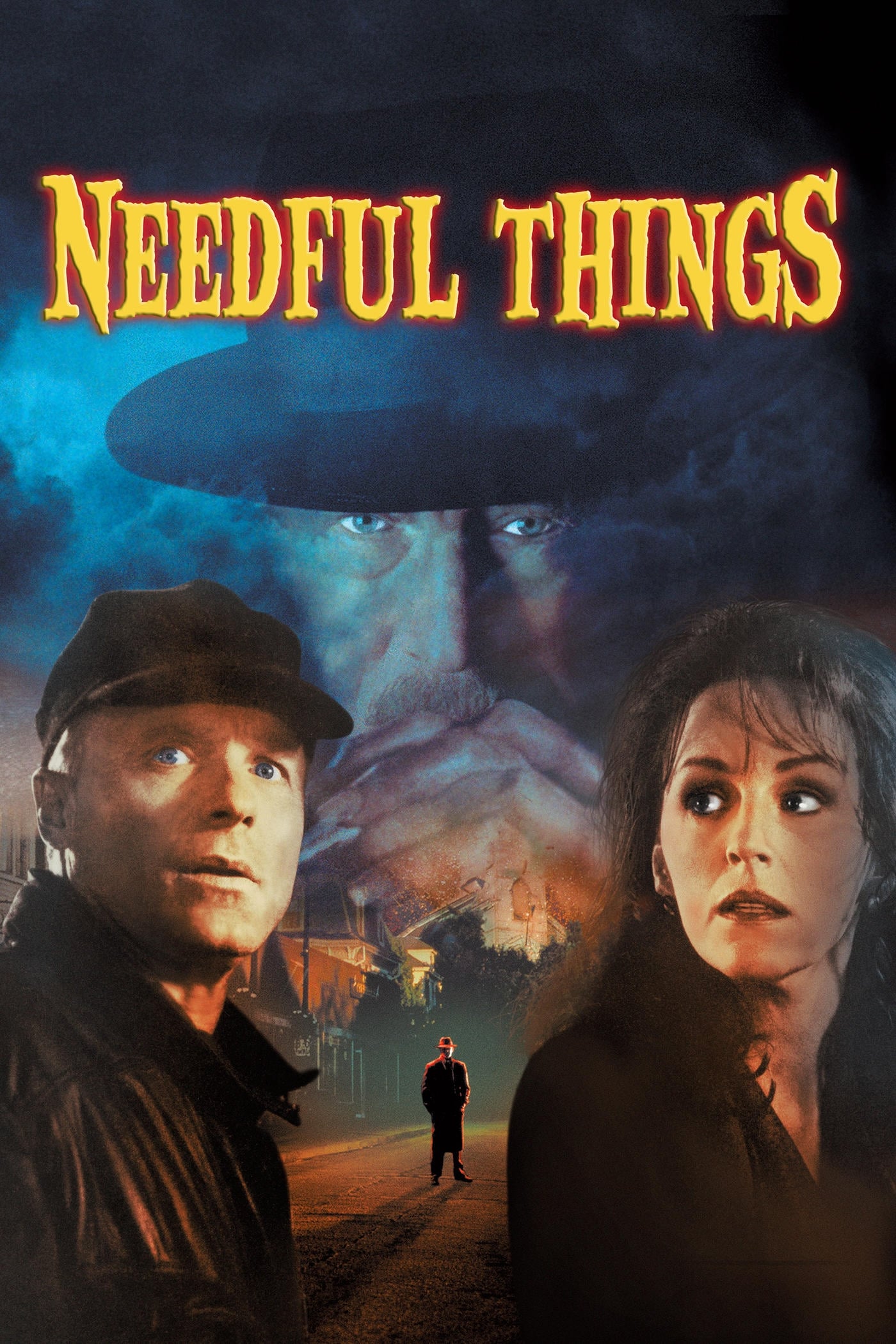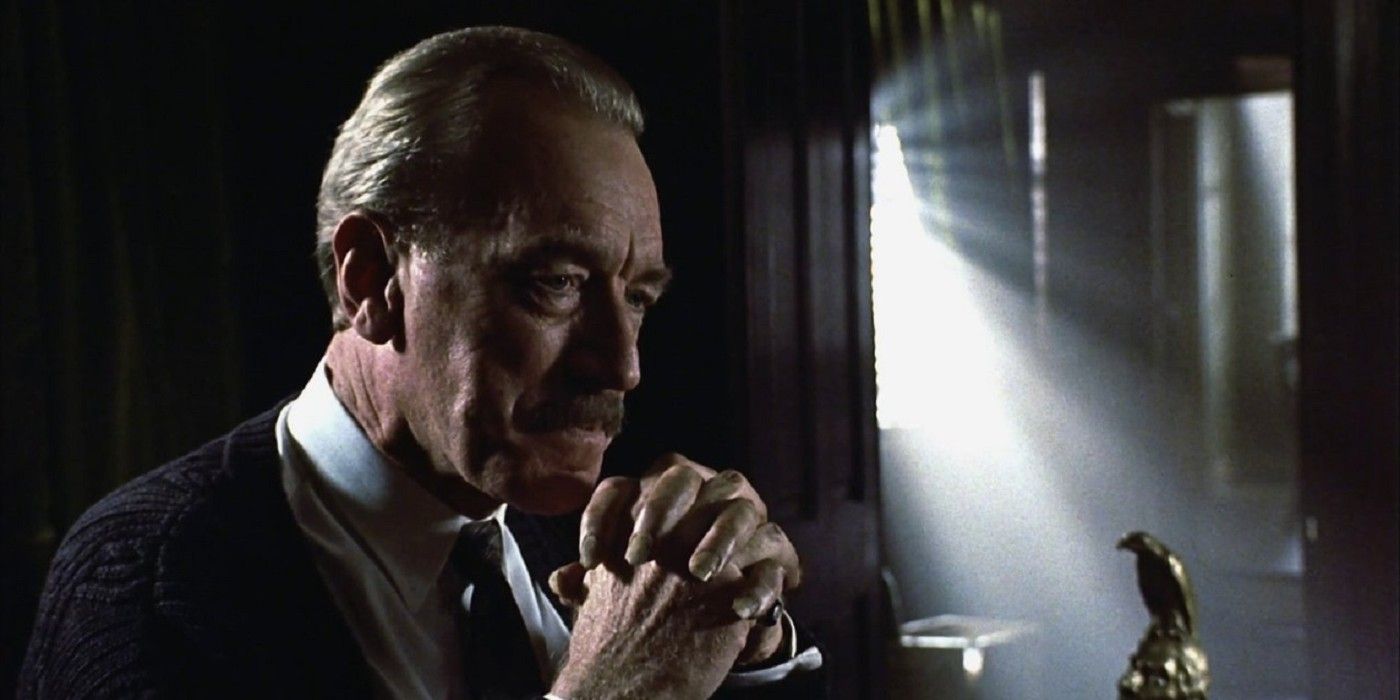A helicopter shot zooms past a lighthouse in the opening sequence of Stephen King’s 1991 novel adaption Needful Things. The lighthouse from Castle Rock Entertainment’s logo is the exact same one that Rob Reiner used to launch the company in 1986 after turning Stephen King’s story “The Body” into Stand by Me.
Many more films based on King’s books would be produced by Reiner’s company in the future, some of which were quite good (such as Misery in 1990) and some of which were not.
Needful Things is without a doubt one of the best; it is not something you should see on a regular basis, but it is the kind of movie that will pass the time on a relaxing afternoon like a good book by the renowned horror novelist.
King’s roughly 700-page book, which is undoubtedly one of his most straightforward yet fascinating works, is reduced in W. D. Richter’s script to its most spectacular protagonists and their most horrible crimes.
It is a well-cast, well-acted, and entertaining movie whose humor is centered on seeing common people from tiny towns fall prey to the devil’s whispers. Fraser C. Heston, the movie’s director, channeled his father, former NRA president Charlton Heston, when Gaunt said, “Guns don’t kill people. People kill people.” The director included allusions to von Sydow’s filmography in his works.
Now it’s time to pay! – Needful Things 1993

The story begins when a strange proprietor, named Leland Gaunt, played by Max von Sydow, claims to be from Akron, Ohio, and arrives in the little hamlet of Castle Rock in Maine in a sinister-looking black automobile to launch a new antique store called “Needful Things.”
When Stand by Me was launched, the distribution business, Castle Rock, was christened after it. Castle Rock also served as the backdrop for Cujo, The Dead Zone, and The Dark Half. It also served as the location for the film Stand by Me. The store sells a variety of things of tremendous personal value to the locals, some of which are obviously supernatural, such as a pendant that relieves pain or even a toy that prophesies the results of horse races.
Gaunt expects compensation in cash as well as tiny “favors,” which are mainly pranks played on his customers’ neighbors by the customers themselves. Gaunt’s first client is a young kid named Brian Rusk, played by Shane Meier, who buys a rare baseball card with Mickey Mantle on it in return for 95 cents as well as a prank on his neighbor next door, Wilma Wadlowski Jerzyck, played by Valri Bromfield.
Gaunt creates an impact on the residents of the town, whom he plays practical jokes on. Danforth Keeton, played by J. T. Walsh is a greedy gambler and boat salesman who embezzled $20,000 from the town folks’ tax money in order to pay off his massive gambling debts.
Sheriff Alan Pangborn, who is played by Ed Harris informs Keeton that people are on to him, and he communicates his anxieties to Gaunt, as well as his disdain for individuals who call him ‘Buster’ Keeton. Sheriff Alan Pangborn reappears in The Dark Half as well.
Gaunt sells a first edition of the book Treasure Island written by Robert Louis Stevenson in great condition to Frank Jewett, who is played by Campbell Lane. When he sells items from his business to both the Catholic priest, who is named Father Meehan and played by W. Morgan Sheppard, and the Baptist minister named Reverend Willie Rose and played by Don S. Davis, he learns about their rivalry.
Gaunt’s true personality is finally revealed when he makes Brian dump muck from a turkey farm over the freshly cleaned spotless white sheets drying on the washing lines at Wilma Jerzyck’s house. When Wilma returns home, she believes the damage was inflicted by her long-time adversary Nettie Cobb, who is played by Amanda Plummer. Amanda Plummer is the daughter of Christopher Plummer, who performed in The Sound of Music as Captain Von Trapp.
She goes to Nettie’s place of work at the Castle Rock diner and accuses her loudly of this. Brian Rusk then meets Gaunt at the Lighthouse, where he informs him that he has not yet repaid his debts and wants immediate payment in full. Brian goes back to Wilma Jerzyck’s home and tosses apples at her windows, smashing them all.
Nettie Cobb ‘purchases’ a Hummel figure from Gaunt that’s also identical to one broken by her abusive ex-husband in a fit of fury. In exchange, she visits Dan Keeton’s house and plasters citation letters from Norris Ridgewick, The Deputy Sheriff, all over the inside, accusing him of all his crimes. Meanwhile, Gaunt gets Hugh Priest to kill Nettie’s dog in exchange for a 1950s jacket similar to the one he wore in college. This results in a brawl involving Nettie as well as Wilma, which leads to their deaths.
Gaunt takes a personal step for Alan by gifting his fiancée Polly Chalmers, played by Bonnie Bedelia, a necklace that heals her debilitating arthritis. Gaunt instructs Polly that in order for it to work, she must never remove it. Gaunt discovers Keeton hiding in his store with a revolver.
He informs Gaunt that he is considering murdering Norris Ridgewick in order to prevent him from alerting everyone about his misdeeds. Gaunt convinces him not to do it and takes away the gun. Brian overhears the sheriff pondering about how the apples got there during the inquiry at Wilma Jerzyk’s residence.
Brian is disturbed that his actions may have contributed to this tragedy and attempts to talk to Alan as to what Gaunt ordered him to do but is too afraid to do so. Later, while Brian is alone at the lighthouse, Alan approaches him and wonders what has him so worried. Brian states that Gaunt is a demon before attempting to kill himself by shooting at his own head. The pistol goes off, but the sheriff saves the kid, and Brian is hospitalized. Eventually, Alan begins to believe that Gaunt is not what he appears to be.
Hugh Priest’s vehicle tires are slashed by Father Meehan. Hugh Priest witnesses what had been done to his truck as he gets booted out of the pub for being too intoxicated. Alan returns from his encounter with Brian wary of Gaunt. Gaunt can be seen studying Treasure Island and subsequently cites Hamlet at one point in the book. He attempts to alert Polly and urges her to remove the necklace, however she refuses.
After Alan leaves, she tries to pry the necklace apart to examine what’s inside and receives an electric shock, which causes the necklace to fly across the room. Polly’s arthritis quickly paralyzes her and she is unable to reach for the necklace. Gaunt arrives in Polly’s room and puts the necklace on her neck.
He says the necklace would be only for $20 and a small prank. Polly is so thankful that she instantly pays him and is visibly captivated by Gaunt, who goes on to seduce her. Following that, he claims Alan is dishonest and has been stealing money from the community alongside Keeton for years. Gaunt persuades Polly to visit Alan’s boat in search of the money. She does, and she notices a large amount of money scattered on her fiancé’s desk. Polly contacts Alan from the boat, accuses him, and cancels the engagement.
Keeton becomes convinced that everyone is trying to harm him, including his spouse Myrtle, and Gaunt persuades him that he really is his sole ally. Keeton is also ordered by Gaunt to attack officer Norris Ridgewick in the police station. Alan manages to restrain Keeton by handcuffing him to his vehicle.
Shortly later, Keeton escapes Ridgewick by striking him in the crotch. He subsequently drives home and blames his wife for committing adultery with Norris before murdering her using a hammer. The phone rings, and it’s Gaunt on the other end. He invites Keeton to come see him because he has something that will help him feel better.
Hugh Priest enters the pub with a shotgun and walks up to the owner, who draws a firearm from behind the bar which leads to them shooting each other. Gaunt’s shenanigans spread across the community and its inhabitants. Misplaced distrust, paranoia, and resentment spread with it.
Gaunt begins selling firearms to his customers, inciting them to murder whoever has wronged them and preying on their selfishness and terror. Gaunt instructs Keeton to plant bombs in the Catholic church, while Alan is talking to Father Meehan about his new fears that Gaunt is indeed the Devil personified, but Meehan does not believe him. The church bursts into flames, but Meehan and Alan escape unharmed. Father Meehan suspects Reverend Willy Rose to be behind the Church attack and leaves to confront him.
A commotion erupts throughout the city, with Gaunt observing from the sidelines. Alan works feverishly to restore order. He draws his rifle on Father Meehan, who is attempting to decapitate Reverend Rose, and Gaunt pushes him to kill them. Gaunt is disappointed as Alan fires in the air.
Alan captures everyone’s attention by convincing the people of Castle Rock to wake up, revealing Gaunt’s real character and his system of lies and deceit. Everybody stops fighting and acknowledges their pranks, however Keeton, who is disheartened, approaches Ridgewick and Alan, pointing a rifle at them and strapping a bomb to himself, intending on blowing everyone up.
Alan talks him down and turns him on Gaunt. Keeton approaches Gaunt, who teases him about his shortcomings and continually refers to him as ‘Buster.’ Keeton, enraged, knocks Gaunt into the store window, detonating the bomb and destroying Needful Things.
Gaunt walks out from the smoldering debris of his business, defeated but unscathed, admitting this wasn’t his greatest effort. Gaunt approaches Alan and Polly, informing them that they are a nice pair and that he will meet their grandchild in 2053—then goes, probably to pursue his nasty evil job somewhere, departing in the very same black car that he arrived in.
Why should you watch Needful Things 1993?

Critics would always deem this film to be overly mainstream just because it was based on a Stephen King story, and it deserved so much better. The substance of the plot, as well as all of the numerous moral articulations, are carried out successfully enough to have an influence on the spectator. Whatever the major subject is, “be careful what you wish for,” surrendering your soul to Satan for a single material thing is presented in such a way that it makes for a riveting viewing.
In a well-paced extremely exciting movie with energy that never seems like it drags on, Ed Harris against Von Sydow in a tiny rural setting, with pretty meaningful comedy thrown out on the sides throughout, coupled with the symbolic elements shown with care during the entire two hours, it all adds up to a fairly decent film. Stephen King understands that the Devil can be stopped, but evil always prevails.
